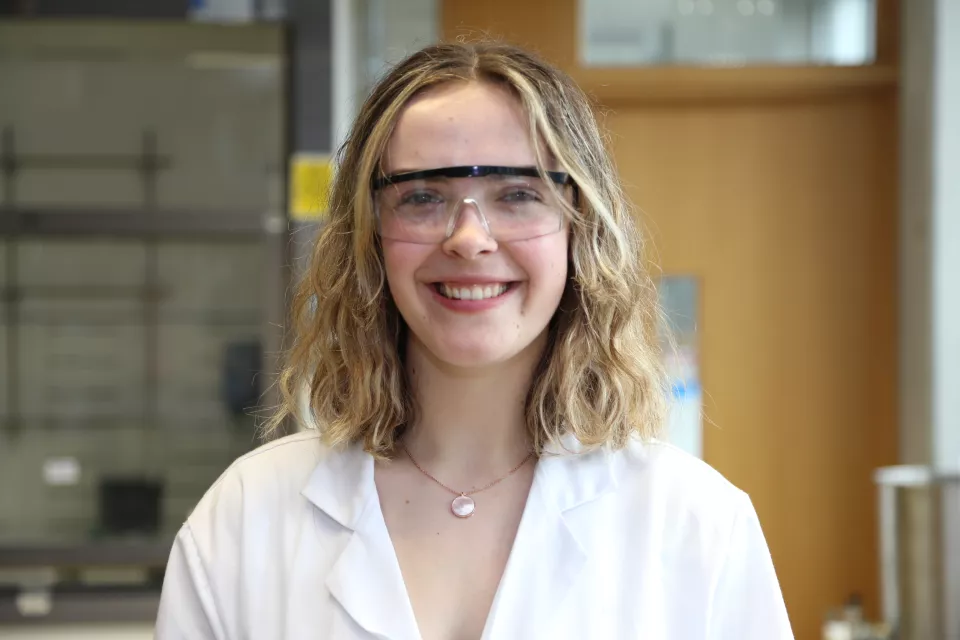
Course: Industrial Biochemistry
Supervisor: Dr Emmet O’Reilly
Name of Research Project/Activity: Specialised Cell Carriers for Adherent Cell-based Biopharmaceuticals.
Q) Can you tell me a bit about yourself, your background, and why you decided to study the course you are taking at UL?
I have always been a curious person, and I have a strong inclination towards science. As I had not taken biology as a Leaving Certificate subject, I looked for a course that would provide me with a fundamental understanding before diving deeper into the world of science. Biological and Chemical sciences was an ideal choice in this regard. As well the inclusion of an eight-month work provided me the confidence that the transition into industry would be a seamless process should I decide to pursue such a path.
Q) What motivated you to apply for the Summer Bursary Programme?
I was motivated to apply for the Summer Bursary Programme for several reasons. One aspect that encouraged me to apply was the opportunity to use the knowledge and skills I have acquired over the past two years in real-life situations, thereby reinforcing and solidifying my understanding of the subject matter.
I thought that participating in the Summer Bursary Programme would provide me with valuable experience and increased confidence working within a laboratory environment, which would be instrumental in preparing me for our upcoming cooperative placement.
Furthermore, the bursary would afford me a valuable balance in my future decision-making process. As I will have been involved in both industry and academia, thanks to co-op and the Summer Bursary Programme, I will be able to gain comprehensive insights into both sectors, enabling me to make well-informed choices regarding my future endeavours.
Q) What are you doing as part of your research here at UL?
The rapid development of the biopharmaceutical industry has resulted in a plethora of products entering the market. Many of these products are derived from adherent cell lines, which require a surface to attach to for effective growth. The aim of my project is to create an optimised carrier cell or scaffold for adherent cell lines from liquid silicone rubber (LSR) and sodium bicarbonate. The creation of an optimised cell carrier would advance the commercial opportunities of adherent cells.
I combined LSR and sodium bicarbonate at different ratios, each ratio was then cured and tested to try to create an optimal ratio. The higher the sodium bicarbonate the more pores are created. Having pores is a desirable trait as a porous structure allows for cells to infiltrate and attach better to the scaffold. However, the addition of excess salt can cause the scaffold to be too brittle. These will then be later tested with an adherent cell line to determine the most suitable choice.
Q) What skills have you developed over the summer?
Many of the skills I have acquired over the summer have been equipment/instrument-based. These include using a
- Mini-screw extruder
- Plasma corona treatment
- SEM imaging
- Spheronizer
Other skills have been group-related skills such as
- Presenting biweekly updates to my supervisors’ team.
- Writing up results in the most coherent and concise manner.
- Working in the same space as other team members.
Q) What has this experience taught you and what would you recommend it to others?
The Summer Bursary Programme was an invaluable experience for countless reasons. My biggest takeaways from it were the confidence it gave me and the hands-on laboratory experience.
While conducting the lab work, I was able to bridge the gap between classroom learning and practical applications. The hands-on approach helped me with critical thinking, honing experimental techniques and gaining a comprehensive understanding of the challenges and rewards associated with research. This allows me to make a more informed decision about whether I would be better suited to further education or industry after completing my degree.
This programme allowed me to network and gain guidance from esteemed researchers and peers. Every person I met was incredibly encouraging and helpful. Exchanging information on different projects that were out of the scope of my project allowed me to gain a better understanding of many subject matters.
The encouraging mentorship and conducting experiments under the guidance of experienced mentors has greatly increased my confidence and capabilities in a laboratory setting.
Q) What are your future career plans, would you consider a career in research?
For the moment, I am unsure of my future career plans. However, I would consider a career in research after experiencing the Summer Bursary Programme. The bursary provides a good opportunity to hear about the different types of projects and talk to people who have/ are doing PhDs, Masters and Postdocs and what their experiences have been like.
